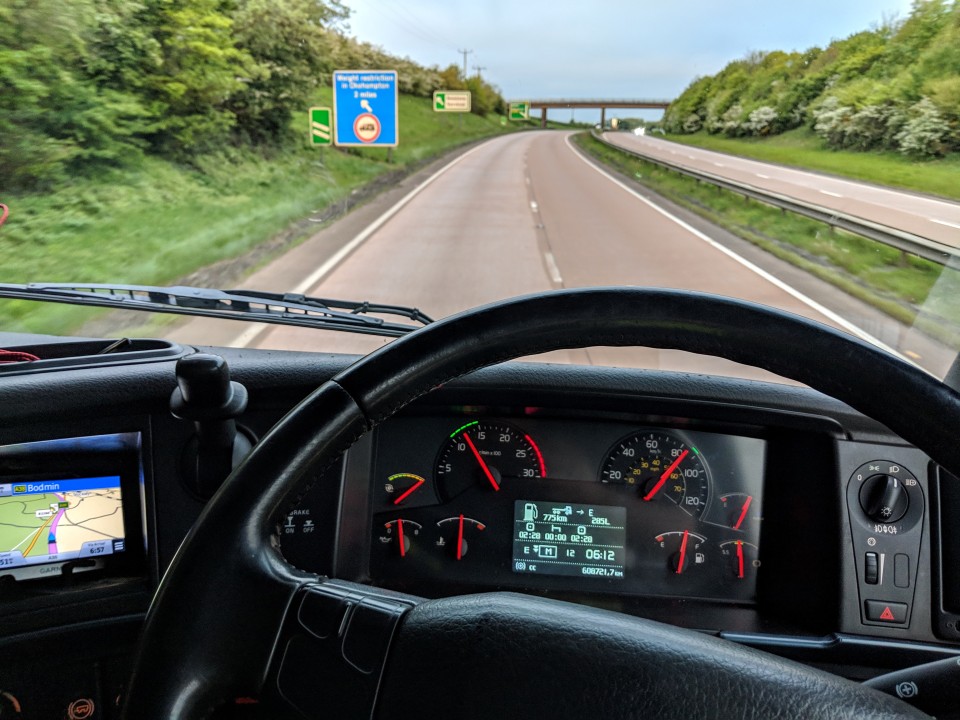
Susie Jones
Jak być zdrowym kierowcą ciężarówki
Utworzony: 27.08.2024
•
Aktualizacja: 27.08.2024
Jako wymagający zawód, prowadzenie ciężarówki często wiąże się z długimi godzinami pracy, siedzącym trybem życia i długimi okresami poza domem, co często odbija się na zdrowiu wielu kierowców.
Niezdrowe nawyki, takie jak spożywanie fast foodów, brak aktywności fizycznej i zaburzone wzorce snu mogą prowadzić do potencjalnych komplikacji zdrowotnych w przyszłości. Ale jak zachować formę jako kierowca ciężarówki? Łatwiej powiedzieć niż zrobić, ale przygotowaliśmy listę wskazówek, które pomogą Ci utrzymać szczytową formę podczas jazdy.
Sześć najważniejszych wskazówek, jak zachować zdrowie w drodze
1.Nawodnienie
Prosta wskazówka i towar, który często bierzemy za pewnik, jednak większość problemów zdrowotnych wynika z odwodnienia. Regularne popijanie wody lub squasha w ciągu dnia wydala odpady metaboliczne i toksyny z organizmu oraz zapewnia większą energię i czujność. Posiadanie przy sobie butelki z wodą do wielokrotnego napełniania nie tylko przypomina o nawodnieniu, ale jest również korzystne dla środowiska.
2.Dieta
Pokusa fast foodów po długim dniu jest czymś, do czego wszyscy możemy się odnieść, jednak podobnie jak utrzymywanie nawodnienia, dieta odgrywa znaczącą rolę w zdrowiu, a także w tym, jak będziesz się czuć przez cały dzień.
Zaleca się, aby kierowcy ciężarówek jedli trzy do czterech razy dziennie, dwa posiłki i dwie przekąski lub dwa posiłki i jedną przekąskę. Staraj się utrzymywać plan posiłków i przekąsek o wysokiej zawartości kwasów omega-3, żelaza i witaminy C, takich jak zielone warzywa liściaste, ryby i owoce. Unikaj często spożywanych pokarmów i napojów, takich jak makaron, chleb, słodkie napoje i używki, takie jak kawa i napoje energetyczne.
Sprawdź naszą listę zdrowych przekąsek, które warto mieć w swojej kabinie:
Batony granola
Batony energetyczne
Popcorn
Orzechy
Suszone owoce
Ciemna czekolada
Oprócz kupowania zdrowej żywności podczas podróży, czasami zdrowsze i bardziej opłacalne może być przygotowywanie posiłków. Frieghtech oferuje fantastyczny wybór przepisów, które pomogą ci utrzymać zdrową dietę podczas pracy.
3.Sleep
Ze względu na charakter pracy, wystarczająca ilość snu może być trudna dla kierowcy ciężarówki i może prowadzić do katastrofalnych skutków dla wszystkich na drodze.
Proste wskazówki i triki, takie jak poniższe, mogą pomóc w porządnym przespaniu nocy:
Stwórz w kabinie środowisko, w którym poczujesz się jak w domu. Sprawdź nasz post o tym, jak sprawić, by kabina ciężarówki stała się domem
Ciemne miejsce do spania
Gorący prysznic: Skorzystaj z naszej strony maps, aby dowiedzieć się, które postoje ciężarówek oferują tę usługę.
Wypróbuj kilka aplikacji ułatwiających zasypianie
Znajdź idealne miejsce do parkowania przy niewielkim hałasie i zakłóceniach. Nasza aplikacja intruck zapewnia 5000 lokalizacji dla pojazdów ciężarowych w całej Europie do wyboru, a nasz zespół SNAP Access and Security może zapewnić indywidualne rozwiązania w zakresie bezpieczeństwa, umożliwiając lepszy sen ze świadomością, że Ty i Twoja ciężarówka jesteście bezpieczni.
4.Ćwiczenia
Jedna z najtrudniejszych wskazówek do przestrzegania podczas podróży, ale niemniej ważna. Długie godziny siedzenia w ciągu dnia mogą prowadzić do złej postawy, bólu pleców i potencjalnych komplikacji zdrowotnych. Po długim dniu za kierownicą może być kuszące, aby usiąść i zrelaksować się, jednak szybkie 15 minut aktywności, takiej jak chodzenie lub rozciąganie, może sprawić, że poczujesz się odmłodzony i mniej zestresowany.
HMD Trucking zawiera kilka przydatnych ćwiczeń dostosowanych do potrzeb kierowców ciężarówek, którzy chcą włączyć kilka rodzajów ćwiczeń fizycznych do swojej rutyny.
5.Witaminy
Bycie w drodze w pełnym wymiarze godzin może utrudnić dostarczenie wszystkich niezbędnych witamin. Codzienne przyjmowanie multiwitaminy może wzmocnić układ odpornościowy i pomóc zachować zdrowie.
6.Zdrowie psychiczne
Wiemy, że dbanie o zdrowie fizyczne na drodze jest ważne, ale ile czasu kierowcy ciężarówek poświęcają na dbanie o swoje zdrowie psychiczne?

Organizacja charytatywna Mind zajmująca się zdrowiem psychicznym opublikowała statystyki ujawniające, że 30% samodzielnie zgłaszanych chorób związanych z pracą w branży transportowej i logistycznej wynika z lęku, samotności, stresu i depresji. Zasugerowali również, że liczba ta może być wyższa, ponieważ większość ludzi nie szuka pomocy, której potrzebują. Ponadto 95% osób przebywających na zwolnieniu lekarskim nie poda prawdziwego powodu swojej nieobecności w pracy, jeśli dotyczy ona ich zdrowia psychicznego.
Przestrzeganie powyższych wskazówek i trików może mieć pozytywny wpływ na zdrowie psychiczne. Ponadto ważne jest, aby prowadzić otwarte i szczere rozmowy z innymi kierowcami ciężarówek, przełożonymi lub dyspozytorami.
Czy ćwiczenia mogą sprawić, że będziesz lepszym kierowcą?
Zdrowy styl życia nie tylko prowadzi do lepszego zdrowia psychicznego, ale dowody sugerują, że może również sprawić, że będziesz lepszym kierowcą. Badanie wykazało, że kierowcy, którzy zostali poproszeni o codzienne ćwiczenia, zgłaszali większą łatwość w obracaniu głowy, byli w stanie obrócić swoje ciało dalej i byli w stanie szybciej wsiąść do samochodu.
Co jest najtrudniejsze w byciu kierowcą ciężarówki?
Długie godziny pracy wydają się być jednym z najtrudniejszych aspektów prowadzenia ciężarówki. Kierowcy ciężarówek często muszą pokonywać długie kilometry i pracować w godzinach aspołecznych. Te długie kilometry i aspołeczne godziny pracy mogą prowadzić do niezdrowego stylu życia.

Jak niezdrowe jest bycie kierowcą ciężarówki?
Ze względu na styl życia wielu kierowców ciężarówek, są oni statystycznie bardziej narażeni na problemy zdrowotne niż osoby wykonujące inne zawody. Kierowcy ciężarówek często mają do czynienia z kilkoma przeszkodami, takimi jak ciasne miejsca pracy, stresujące sytuacje, nietypowe wzorce snu i brak odżywczego jedzenia, które mają wpływ na ich zdrowie.
Utrzymanie zdrowego stylu życia jako kierowca ciężarówki wymaga świadomego wysiłku, ale korzyści z tego płynące są tego warte. Powyższe wskazówki pozwolą ci przejąć kontrolę nad swoim zdrowiem i poprawić samopoczucie. Wypatruj więcej porad i wskazówek od nas w SNAP.



